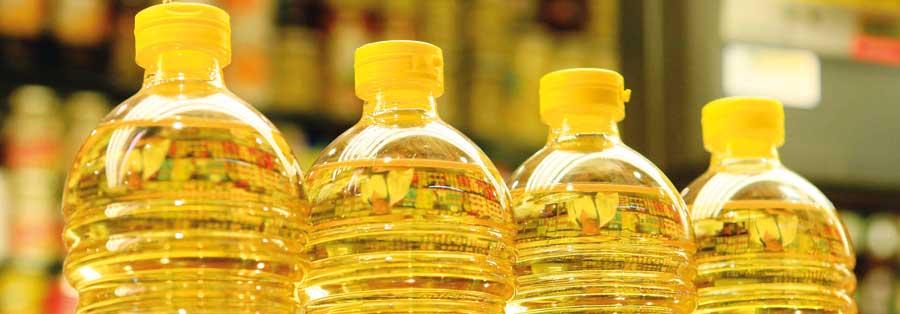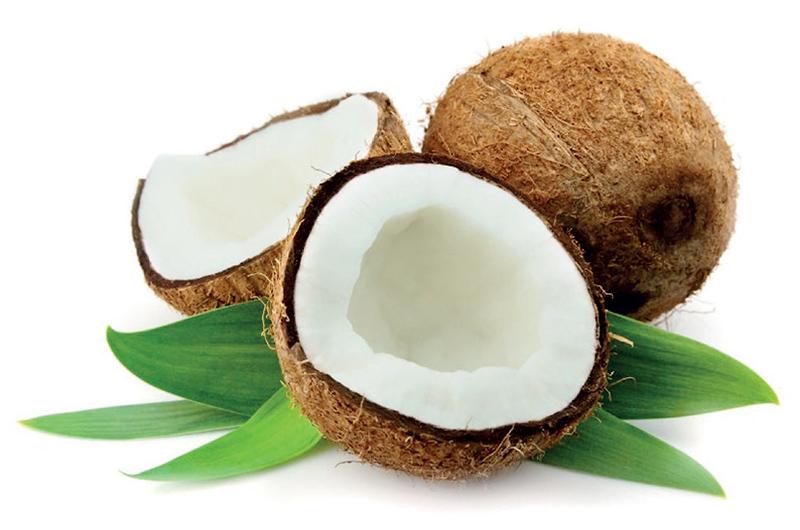31 Mar 2021 - {{hitsCtrl.values.hits}}
IMPORTERS ORDERED TO RE-EXPORT THE COCONUT OIL

 Consumers are in a quandary wondering how they could possibly fry the kavum and kokis this festive season with the unhealthy coconut oil that has dominated the market. Days after the billion-rupee sugar scam was exposed; several activists claimed that unhealthy coconut oil is being imported by large scale importers. Last year, a request was made to allow the import of raw materials to produce coconut oil locally. However, following the allegations, coconut oil samples from the four importers were sent for testing. Results of the second test confirmed that the samples of three of the importers contained aflatoxins, a carcinogenic agent.
Consumers are in a quandary wondering how they could possibly fry the kavum and kokis this festive season with the unhealthy coconut oil that has dominated the market. Days after the billion-rupee sugar scam was exposed; several activists claimed that unhealthy coconut oil is being imported by large scale importers. Last year, a request was made to allow the import of raw materials to produce coconut oil locally. However, following the allegations, coconut oil samples from the four importers were sent for testing. Results of the second test confirmed that the samples of three of the importers contained aflatoxins, a carcinogenic agent.
 "Some were asking if we would be increasing the price of coconut oil but we do not have coconut oil or rather manufacturing locally to increase the price. Our stakeholders have been destroyed long time ago. We are earnestly telling the government to import raw materials"
"Some were asking if we would be increasing the price of coconut oil but we do not have coconut oil or rather manufacturing locally to increase the price. Our stakeholders have been destroyed long time ago. We are earnestly telling the government to import raw materials"
|
Anusha Pelpita Industry and Commerce Ministry Secretary
|
Plight of traditional coconut oil manufacturers
“Since last year the All Ceylon Traditional Coconut Oil Manufacturer’s Association (ACTCOMA) has been monitoring coconut oil imports and we observed that the sales price of coconut oil is less than the international trading prices,” ACTCOMA Convener Buddhika De Silva said. “Therefore there was some sort of adulteration that was being carried out by large scale importers. The contents comprised 60% poor quality oil, 30 to 35% artificial oil including animal fat and any type of cheap oil and 5 to 10% essence to get the odour. After it is mixed they import this to Sri Lanka saying it is unrefined oil.”
Mr. De Silva said this was one of the reasons for coconut industrialists to go bankrupt though coconut oil manufacturing has been an industry that has existed for generations. “It has a heritage of its own. When we found that this was happening we brought it to the notice of Trade and Commerce Minister Wimal Weerawansa.
 "If consumed heavily, it will lead to acute toxicity and would damage the liver leading to acute liver failure. If small amounts are consumed for a long period of time, that too is harmful to the body. This mainly affects children as it hinders their development. Aflatoxins are also known to be carcinogenic"
"If consumed heavily, it will lead to acute toxicity and would damage the liver leading to acute liver failure. If small amounts are consumed for a long period of time, that too is harmful to the body. This mainly affects children as it hinders their development. Aflatoxins are also known to be carcinogenic"
|
Buddika De Silva ACTCOMA Convener
|
|
Prof Arjuna De Silva Consultant Gastroenterologist and Head of the Department at the Kelaniya University Medical Faculty
|
|
Lasantha Alagiyawanna State Minister of Co-operative Services, Market Development and Consumer Protection
|
|
Dr. Siddhika Senaratne SLSI Director General
|
It was then referred to State Ministers Ramesh Pathirana and Arundika Fernando and a Cabinet paper was drafted to get approval to import raw materials for the production of coconut oil locally. These raw materials are now being used by multinational companies for exporting purposes. During the 1980s, when the then ruling party introduced the open economy, the Agro industry was manipulated by multinational companies. This created a void in the consumer market. Once all this was explained a joint Cabinet decision was made in December 2020 to import raw materials. But unfortunately it is still not happening because of the red tape in government institutions,” he said.
Mr. De Silva said the government should take a stand since industries are ready to manufacture coconut oil locally. “We will provide an assured product to the consumer. Some were asking if we would be increasing the price of coconut oil but we do not have coconut oil or rather manufacturing locally to increase the price. Our stakeholders have been destroyed long time ago. We are earnestly telling the government to import raw materials. We will give the required oil at an assured price. We do not want to make huge profits but only want to survive. Local manufacturers contribute to the micro economy in a large way,” Mr. De Silva said. “In January alone, 37,000 metric tons of coconut oil were imported to Sri Lanka at a cost of Rs.10.5 billion. But if you take a bottle of vegetable oil in the market and read the ingredients, it mentions RBD Palm Oil. They are cheating the consumers. They import these in bulk and take tax benefits as well. They are therefore killing local industrialists as well as the public. The least they could do is to give a good product to the consumers.”
When asked what the government should do about the 13 containers of coconut oil, Mr. De Silva said ideally the government should consider destroying them and penalizing the importers. “A thorough testing should be carried out on products available in the market. There has to be a regulatory system to regulate these people,” he said.
Mr. De Silva said that Sri Lanka required 180,000 metric tons of coconut oil annually and that they were quite capable of meeting this demand. “But out of the 102 members in the list only 22 factories are currently in operation. This is the plight of an industry that has been one of the major contributors to the micro economy of the country,” he said.
Aflatoxins form on their own
One of the main arguments is that imported coconut oil contained aflatoxins, which are carcinogenic agents. But Prof. Arjuna De Silva, Consultant Gastroenterologist and Head of the Department at the Kelaniya University Medical Faculty said aflatoxins are a family of toxins that are produced by a certain fungi in agricultural crops such as maize and peanut. “If heavily consumed, it will lead to acute toxicity and would damage the liver leading to acute liver failure. Small amounts consumed for a long period of time are also harmful to the body. This mainly affects children by hindering their development. Aflatoxins are also known to be carcinogenic. There may be problems if consumed during pregnancy,” he said.
Prof. De Silva said heating coconut oil is not sufficient to deactivate the toxins but it will be deactivated because of radiation and added that 10 micrograms per kilogram is the cut off point for aflatoxins in Sri Lanka. “If found in large quantities the products are rejected.”
He also stressed the fact that it was not an agent that was deliberately included in an adulteration process but a toxin that forms on its own due to careless storage practices.
Cabinet approval sought to ban adulterating coconut oil
Industry and Commerce Ministry Secretary Anusha Pelpita said Cabinet approval has been sought to ban adulterating coconut oil and to import raw materials so that local manufacturers can begin producing coconut oil here. He said a reminder would be sent to the Consumer Affairs Authority Chairman to speed up the regulatory process.
Necessary measures being taken
On Monday, State Minister of Co-operative Services, Market Development and Consumer Protection, Lasantha Alagiyawanna announced that three out of the four companies importing coconut oil had been rejected as the second test also confirmed that they contained carcinogenic agents. “We are taking necessary measures to ensure that these containers are re-exported. If these companies attempt to refine oil brought in these containers they would be penalized,” he said.
When asked if the government was not aware of this issue, the minister said 6,000 metric tons were imported in 2019 as well. “This is not a new phenomenon. The CAA has collected 125 samples from all 25 districts which have been sent for testing,” he said.
No edible oil is regulated in SL
At the onset of this oily incident, the Sri Lanka Standards Institution (SLSI) denied reports that they had authorized the sale of unhealthy coconut oil imported by four importers to Sri Lanka. Following claims, SLSI Director General Dr. Siddhika Senaratne said the Institution would not compromise the set standards for any commodity or material that would be detrimental to the lives and livelihoods of the people.
She stressed that the coconut oil in the 13 containers had not been approved for sale to consumers by any of the authorities including Sri Lanka Customs, SLSI, or the Health Ministry Food Control Unit. The CAA is also conducting tests.
In her comments to the Daily Mirror Dr. Senaratne said the oil samples by the four importers were tested only for aflatoxins as it is formed by a fungus and when asked about the presence of palm oil in vegetable oils available in the market she said that no edible oil is regulated in Sri Lanka.

27 Nov 2024 9 minute ago
27 Nov 2024 48 minute ago
27 Nov 2024 1 hours ago
27 Nov 2024 1 hours ago
27 Nov 2024 1 hours ago